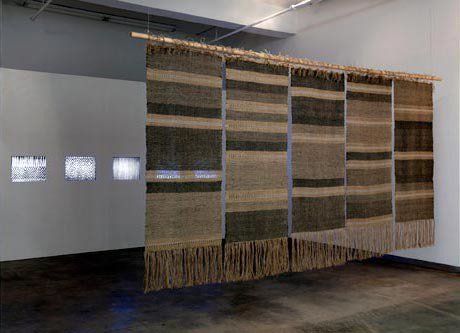Two exhibitions
dal 1/3/2013 al 14/6/2013
Segnalato da
1/3/2013
Two exhibitions
Whitworth Art Gallery, Manchester
The solo show by Callum Innes features his best known series of work, Exposed Paintings and Monologues. Since the early 1970s, Beryl Korot was an active player in New York's then emergent video-art scene.

CALLUM INNES
Whitworth Art Gallery is delighted to be presenting two of Callum Innes’s best
known series of work, ‘Exposed Paintings’ and ‘Monologues’, which will
include a new set of watercolours made specifically for the Whitworth.
One of Britain’s best-known abstract painters,
Innes’ constantly evolving practice is often
described as ‘un-painting’ given that the works
which form his on-going series ‘Exposed
Paintings’ are produced by layering oil paint
onto the canvas and then removing the paint
with washes of turpentine. In the ‘Exposed
Paintings’ on show at the Whitworth, Innes
washes off layers of black oil paint to reveal
startlingly flecked violet or green, the washes of
the black paint on the canvas below.
In his powerful ‘Monologues’ series, Innes
experiments with the power of colour in a
sequence of watercolour paintings. By layering
and dissolving two colour washes into each
other, Innes creates an
undefinable third colour leaving the original
pigments just visible on the edges of the
painted surface. Innes’s subtle actions create
paintings with complex depth, demonstrating
the process and time of their making.
---
BERYL KOROT
Since the early 1970s, Beryl Korot
was an active player in New
York’s then emergent video-art
scene and has been recognized
as a pioneer of video art and of
multiple channel work in
particular.
‘Text and Commentary’ (1976-7),
one of Korot’s best known works
was inspired by the punch card
system of the Jacquard loom and
its impact on Charles Babbage, a
mathematician who originated
the idea of a programmable black and white
computer in the 19th century. The
installation at the Whitworth opens
to the public on 2 March and
includes five weavings made by
Korot herself, which will hang in the gallery alongside five video monitors and
five drawings.
‘Text and Commentary’ links information processing and communications
systems both past and future, from the primitive loom to modern video. The
patterns created by the loom and seen through the weave’s design can be
extended to the lines of data used by computers and the patterns made
through the use of punch cards to guide the hooks and harness for the
weave’s design. The work both encodes the history of a culture and is an
example of how the video medium moved beyond the television’s frame
and into a vocabulary of installation.
‘The thing that attracted me to the loom was its sophistication as a
programming tool – it programs patterns through the placement of threads,
in a numerical order that determines pattern possibilities,’ said Korot in a 1977
New York Times article. ‘It’s like the first computer on earth.’
For further press information and to request images please contact:
Catherine McClelland or Anna Jones on + 44 (0)20 7183 3577 or email
catherinem@suttonpr.com / anna@suttonpr.com
For regional press enquiries please contact Tim Manley at the Whitworth Art
Gallery on 07810 152655 or email tim.manley@manchester.ac.uk
Saturday Supplement: Artist Talk:
Saturday 2 March, 1pm, free
Beryl Korot will be giving an artist talk on Text and Commentary.
Saturday 2 March, 2.30pm, free
Join Callum Innes as he discusses his paintings and works on paper within the exhibition.
Whitworth Art Gallery
Oxford Road (The University of Manchester), Manchester
Hours: Monday to Saturday 10am-5pm, Sunday 12-4pm
Free Admission



